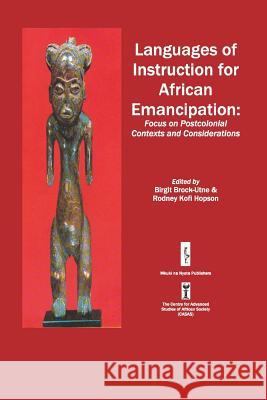Languages of Instruction for African Emancipation » książka
Languages of Instruction for African Emancipation
ISBN-13: 9789987417360 / Angielski / Miękka / 2000 / 268 str.
With rhetoric in the twenty first century focused on the African Renaissance, the central role of language in the development and emancipation of the continent seems to have taken a backseat. The fact that many countries on the continent are operating with pre-independent and colonial language policies is catastrophic to large numbers of people who are not in a position to participate in the political democracies of their countries. Languages of Instruction for African Emancipation is a collection of case studies from seven African countries that poses questions such as: What alternatives are there for educational language policies toward African emancipation? What efforts have governments made to change language policies to favor African languages and how far have they succeeded? What challenges do African learners face when it comes to current language of instruction policies? The authors reject a language education policy that neglects the multilingualism existing in Africa and that reinforces patterns of privilege that existed in the colonial era, further entrenching the schism between the elite and the masses. They give short shrift to the "new" justification of the unjustifiable status accorded to English in Africa as the language of globalization, suggesting that it is not relevant to the vast majority of African lives and their human development. The sum of thoughts presented suggests that the answer to the language question provides the key to development challenges and further emancipation of the African peoples, which, it is argued, is at the same time a question that will determine whether Africa will remain a recognizable and distinctive cultural component of humanity orwhether Africans will cease to exist culturally as Africans. This is a co-publication with the Centre for the Advanced Study of African Societies, the pioneering research organization dedicated to the furtherance of African languages for education and development.
Languages of Instruction for African Emancipation is a collection of case studies from seven African countries poses questions such as: What alternatives are there for educational language policies towards African emancipation? What efforts have governments made to change the language policy in favour of African languages and how far have they succeeded? What challenges do African learners face when it comes to current language of instruction policies? The authors reject a language education policy that neglects the multilingualism existing in Africa; that reinforces patterns of privilege that existed in the colonial era, further entrenching the schism between the elite and the masses. They give short shrift to the new justification of the unjustifiable status accorded to English in Africa as the language of globalisation, suggesting that it is not relevant to the vast majority of African lives and their human development. The sum of thoughts presented suggests that the answer to the language question provides the key to development challenges and further emancipation of the African peoples, which, it is argued, is at the same time a question that will determine whether Africa will remain a recognisable and distinctive cultural component of humanity or whether Africans will cease to exist culturally as Africans.











